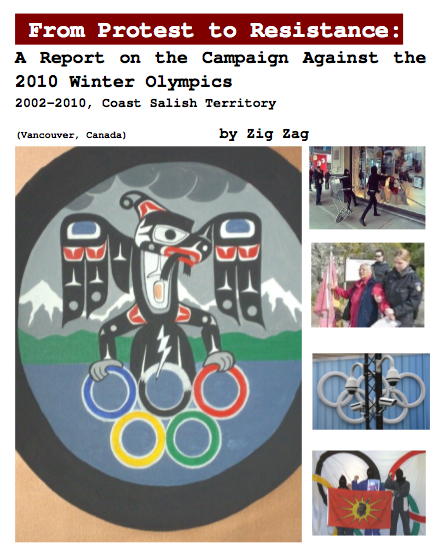STORY posted on May 10, 2010 by dawn
Resist 2010 Redux
A comprehensive summary of resistance to the 2010 Olympics
Click here to read the full, 38 page report on resistance to the 2010 Olympics.
Introduction
From 2002 to 2010, an anti-Olympic protest and resistance movement emerged in and around Vancouver, British Columbia, developing also into a national network. This time period can be divided
into two distinct phases of protest & resistance.
By protest, I mean activities designed primarily to raise awareness and mobilize people into a political struggle. It is used by groups to focus attention on a problem, influence public opinion, and create political pressure on a government or business. Protests are often used by groups lobbying for changes in laws or government policies.
By resistance, I mean these protest activities plus direct actions (both public and clandestine) that seek to stop or disrupt the activities of our opponent, or to gain resources, terrain, or some other
material benefit. Blocking a road may stop logging operations, for example, or squatting an empty building may provide shelter. Direct action can cause economic and material damage to an opponent, and raise the fighting spirit of the people by showing them their potential power.
The protest phase of the anti-Olympic campaign (2002-2005), consisted largely of rallies (including several tent villages/homeless camps), forums, and a campaign for a 'No' vote in a city-wide plebiscite. It was also during this period that the housing/homelessness struggle, primarily in Vancouver's Downtown Eastside (DTES), began to intensify (beginning with the 2002 campaign to
have the vacant Woodward's department store turned into social housing).
The resistance phase (2006-2010) was characterized by larger, militant protests involving public direct actions (such as squats, disruptions, and blockades), as well as clandestine acts of vandalism & sabotage. This movement had a radical critique of the Olympic industry as a whole, and not just its negative consequences. It had a strong anti-colonial and anti-capitalist perspective. This second phase also expanded to a national level with solidarity actions and disruption of Olympic events across the country.
The anti-Olympic resistance was a unique movement, organizing against a particular type of large-scale industry, that none of us involved in had any experience with. We had to educate ourselves on what the IOC was, how the industry was organized, who was involved, its history, the impacts of Olympics on host cities and regions, and how other people resisted. Because of the scale of the Olympics, and the powerful propaganda that legitimizes them, this process of education took some time.
The campaign extended over several years and involved numerous activities, ranging from direct action to producing videos, speaking tours, newsletters, conferences, workshops, etc. Over 30 public direct actions, including squats, disruption of events, and blockades, occured. Over 60 clandestine acts of vandalism and sabotage were carried out. Over 80 arrests occurred in Vancouver and other cities from 2006-2010 (mostly from public direct actions). Some 27 additional arrests occurred during the Olympic Games themselves (Feb 12-28, 2010).
The anti-2010 Olympic resistance movement had a considerable impact on the city, region,country, and the Olympic industry itself. There is no doubt it influenced public opinion, with polls as recent as October 2009 (i.e., the Canadian Press Harris-Decima survey) showing over 30 percent of people in BC supported the anti-Olympic protests, and over 70 percent believing the Olympics cost too much.
Pollsters were surpised by the results, which showed the massive unpopularity of the Games, a phenomenon that had not existed prior to 2007 (when militant direct actions began). In fact, a poll by marketexplorers in Feb. 2003 showed that 69 percent of Vancouver residents supported the bid at that time.
By the time militant resistance got underway in 2007, Vancouver had experienced a large increase in homelessness that was clearly linked to the Olympics. People also had a better sense of the potential costs of the Games (some $6 billion), the extent of ecological destruction, the criminalization of the poor (i.e., the Safe Streets Act, passed in 2004), etc. They also began to see the arrogant and dictatorial style used by the International Olympic Committee (IOC) and the Vancouver Organizing Committee (VANOC). The resistance gave expression to this discontent and helped clarify what the Olympic industry was, as well as the negative impacts associated with hosting the Games.
The movement helped mobilize thousands of people, in both Vancouver and across the country,
to go out in the streets and show their opposition. In the fall of 2008, the CP Spirit Train was protested & disrupted in five of the ten cities it stopped at. The torch relay from October 2009-February 2010 was disrupted in over 30 cities, towns and reservations.
The main slogan used in virtually every protest was 'No Olympics on Stolen Native Land'. This
was the primary slogan used from 2007-2010, and was adopted by the ORN when it formed in 2008.
ORN, a coalition of radical groups & individuals in the Vancouver area, organized its anti-Olympic
campaign as an anti-colonial and anti-capitalist resistance movement. It was the primary coordinator of both local and national anti-Olympic opposition, including the CP Spirit Train, Torch Relay, and the
Feb. 12, 2010, protest of some 4-5,000 people.
ORN also organized numerous conferences, training workshops, fundraising concerts, public forums, and speaking tours. The group produced educational leaflets, posters, t-shirts, and banners.
The culmination of two years of organizing by ORN was the 2010 Anti-Olympic Convergence, which
lasted from Feb. 10-15, 2010.
The site for the Vancouver local of The Media Co-op has been archived and will no longer be updated. Please visit the main Media Co-op website to learn more about the organization.
